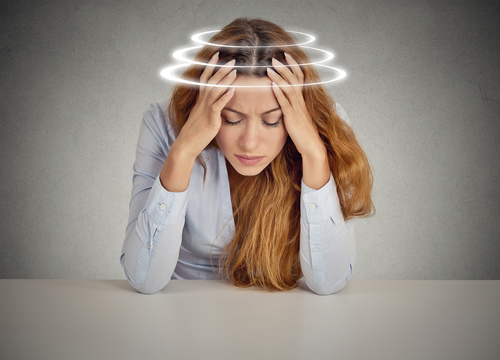
Dizziness, tinnitus - frequent complaints that patients present when contacting doctors of various specialties. Currently, there are more than 80 diseases accompanied by similar symptoms. Dizziness is a condition in which there is a sensation of movement of the surrounding objects or one's own body. Coordination of movements is impaired, gait changes, and the risk of falls increases.
Normally, in humans, the work of all organs and systems, including the cardiovascular and vestibular, is subject to the autonomic nervous system. Failure in the work of the latter leads to spasm, narrowing or, conversely, expansion of the vessels of the brain, impaired blood flow in them and, as a consequence, a decrease in the supply to the vestibular apparatus and the center of equilibrium of oxygen and nutrients substances.
Features of symptoms
Dizziness and tinnitus may appear against the background of both an increase and a decrease in blood pressure. Often these symptoms are combined with headache, weakness, nausea, pallor, excessive sweating, and anxiety. As a rule, with vegetative-vascular dystonia, these symptoms are of a short-term nature, they can pass on their own, without any help, and are not dangerous to human life. For more serious diseases (neoplasms of the brain, stroke, vertebrobasilar insufficiency, pathology of the inner ear, osteochondrosis of the cervical spine) dizziness and tinnitus are constant character.
Most often, patients with dizziness and tinnitus come for a consultation with a neurologist. It is known that there are many reasons for these symptoms. Determining the exact cause and prescribing the correct treatment requires versatile examination of the patient: ultrasound examination of cerebral vessels, brachiocephalic and vertebral arteries; electroencephalography, magnetic resonance imaging of the brain, radiography of the cervical spine. In some cases, the participation of one neurologist is not enough; consultation of an otolaryngologist, cardiologist, endocrinologist is indicated.
To cure or not to cure is the question
At a young age, dizziness and tinnitus often cause a decrease in a person's working capacity and activity, self-doubt, feelings of anxiety, fear, and a deterioration in the emotional background. In this regard, it is extremely important to seek medical help in a timely manner, correctly establish a diagnosis and develop an individual treatment regimen. They start with general strengthening measures: therapeutic gymnastics aimed at reducing psycho-emotional stress and training the vestibular apparatus; optimization of the regime of work and rest. But in practice, it is not always possible to exclude or even reduce mental and physical stress. Therefore, it is recommended to combine restorative measures with drug correction. For treatment, tonic or sedatives, vitamins, as well as drugs that improve cerebral blood flow, metabolism and recovery processes in organs and tissues are used. For example, doctors recommend Eltacin, which contains a combination of amino acids that are directly involved in metabolic processes in tissues: glycine, glutamic acid and cystine.
Remember that dizziness and tinnitus can be symptoms not only of vegetative-vascular dystonia, but also of many life-threatening diseases. If the unpleasant symptoms are persistent and, moreover, they disrupt the usual way of life, interfere with full-fledged work and rest, it is necessary, without hesitation, to consult a doctor.



